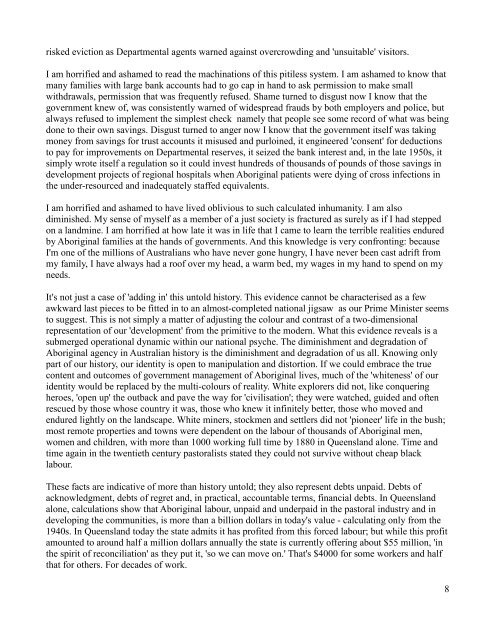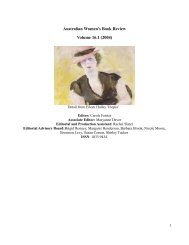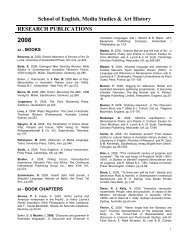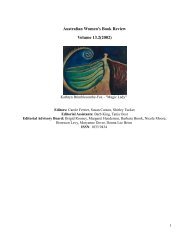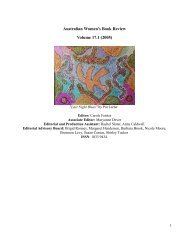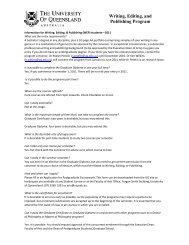Australian Women's Book Review Volume 14.1 - School of English ...
Australian Women's Book Review Volume 14.1 - School of English ...
Australian Women's Book Review Volume 14.1 - School of English ...
You also want an ePaper? Increase the reach of your titles
YUMPU automatically turns print PDFs into web optimized ePapers that Google loves.
isked eviction as Departmental agents warned against overcrowding and 'unsuitable' visitors.<br />
I am horrified and ashamed to read the machinations <strong>of</strong> this pitiless system. I am ashamed to know that<br />
many families with large bank accounts had to go cap in hand to ask permission to make small<br />
withdrawals, permission that was frequently refused. Shame turned to disgust now I know that the<br />
government knew <strong>of</strong>, was consistently warned <strong>of</strong> widespread frauds by both employers and police, but<br />
always refused to implement the simplest check namely that people see some record <strong>of</strong> what was being<br />
done to their own savings. Disgust turned to anger now I know that the government itself was taking<br />
money from savings for trust accounts it misused and purloined, it engineered 'consent' for deductions<br />
to pay for improvements on Departmental reserves, it seized the bank interest and, in the late 1950s, it<br />
simply wrote itself a regulation so it could invest hundreds <strong>of</strong> thousands <strong>of</strong> pounds <strong>of</strong> those savings in<br />
development projects <strong>of</strong> regional hospitals when Aboriginal patients were dying <strong>of</strong> cross infections in<br />
the under-resourced and inadequately staffed equivalents.<br />
I am horrified and ashamed to have lived oblivious to such calculated inhumanity. I am also<br />
diminished. My sense <strong>of</strong> myself as a member <strong>of</strong> a just society is fractured as surely as if I had stepped<br />
on a landmine. I am horrified at how late it was in life that I came to learn the terrible realities endured<br />
by Aboriginal families at the hands <strong>of</strong> governments. And this knowledge is very confronting: because<br />
I'm one <strong>of</strong> the millions <strong>of</strong> <strong>Australian</strong>s who have never gone hungry, I have never been cast adrift from<br />
my family, I have always had a ro<strong>of</strong> over my head, a warm bed, my wages in my hand to spend on my<br />
needs.<br />
It's not just a case <strong>of</strong> 'adding in' this untold history. This evidence cannot be characterised as a few<br />
awkward last pieces to be fitted in to an almost-completed national jigsaw as our Prime Minister seems<br />
to suggest. This is not simply a matter <strong>of</strong> adjusting the colour and contrast <strong>of</strong> a two-dimensional<br />
representation <strong>of</strong> our 'development' from the primitive to the modern. What this evidence reveals is a<br />
submerged operational dynamic within our national psyche. The diminishment and degradation <strong>of</strong><br />
Aboriginal agency in <strong>Australian</strong> history is the diminishment and degradation <strong>of</strong> us all. Knowing only<br />
part <strong>of</strong> our history, our identity is open to manipulation and distortion. If we could embrace the true<br />
content and outcomes <strong>of</strong> government management <strong>of</strong> Aboriginal lives, much <strong>of</strong> the 'whiteness' <strong>of</strong> our<br />
identity would be replaced by the multi-colours <strong>of</strong> reality. White explorers did not, like conquering<br />
heroes, 'open up' the outback and pave the way for 'civilisation'; they were watched, guided and <strong>of</strong>ten<br />
rescued by those whose country it was, those who knew it infinitely better, those who moved and<br />
endured lightly on the landscape. White miners, stockmen and settlers did not 'pioneer' life in the bush;<br />
most remote properties and towns were dependent on the labour <strong>of</strong> thousands <strong>of</strong> Aboriginal men,<br />
women and children, with more than 1000 working full time by 1880 in Queensland alone. Time and<br />
time again in the twentieth century pastoralists stated they could not survive without cheap black<br />
labour.<br />
These facts are indicative <strong>of</strong> more than history untold; they also represent debts unpaid. Debts <strong>of</strong><br />
acknowledgment, debts <strong>of</strong> regret and, in practical, accountable terms, financial debts. In Queensland<br />
alone, calculations show that Aboriginal labour, unpaid and underpaid in the pastoral industry and in<br />
developing the communities, is more than a billion dollars in today's value - calculating only from the<br />
1940s. In Queensland today the state admits it has pr<strong>of</strong>ited from this forced labour; but while this pr<strong>of</strong>it<br />
amounted to around half a million dollars annually the state is currently <strong>of</strong>fering about $55 million, 'in<br />
the spirit <strong>of</strong> reconciliation' as they put it, 'so we can move on.' That's $4000 for some workers and half<br />
that for others. For decades <strong>of</strong> work.<br />
8


